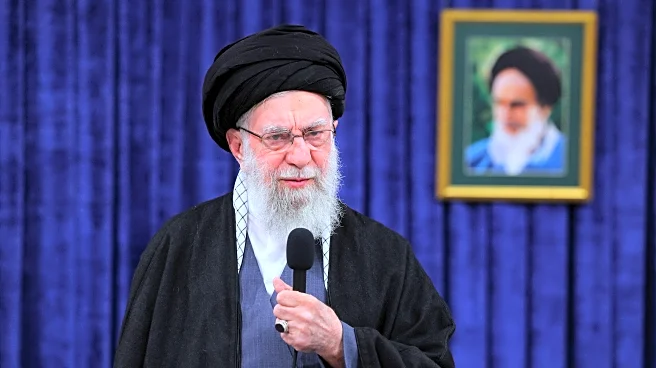What's Happening?
The United Nations' nuclear watchdog has initiated repairs on the power supply to Ukraine's Zaporizhzhia nuclear power plant. This development comes after a four-week outage that left the plant reliant
on backup generators. The head of the International Atomic Energy Agency (IAEA), Rafael Grossi, announced that Russian and Ukrainian forces have agreed to special ceasefire zones to facilitate the repairs. The restoration of off-site power is deemed crucial for the plant's safety and security. The Zaporizhzhia plant, Europe's largest nuclear facility, has been under Russian control since early in the conflict and has been operating on diesel generators since September 23, when its last external power line was damaged.
Why It's Important?
The repair of the Zaporizhzhia nuclear plant's power supply is significant for nuclear safety in the region. The plant's reliance on backup generators posed a risk of nuclear incidents, as these generators are intended as a last line of defense. The ongoing conflict between Russia and Ukraine has repeatedly threatened the plant's operational stability, highlighting the broader risks of warfare near nuclear facilities. The successful restoration of power could prevent potential nuclear hazards, ensuring the safety of the plant's reactors and spent fuel. This development also underscores the importance of international cooperation in mitigating nuclear risks during conflicts.
What's Next?
The repair work on the Zaporizhzhia plant will proceed in two phases, focusing first on the Ferosplavna-1 power line and then the Dniprovska power line. The IAEA will continue to monitor the situation closely, as the plant's safety remains a priority amid the ongoing conflict. The establishment of ceasefire zones for the repairs may serve as a model for future cooperation between conflicting parties to address critical infrastructure needs. However, the broader conflict continues, and the risk to nuclear safety persists as long as hostilities remain unresolved.
Beyond the Headlines
The situation at the Zaporizhzhia plant highlights the complex interplay between warfare and nuclear safety. The reliance on diesel generators as a frequent necessity rather than an emergency measure raises concerns about the long-term sustainability of nuclear safety protocols in conflict zones. This incident may prompt a reevaluation of international nuclear safety standards and emergency preparedness in regions prone to conflict. Additionally, the cooperation between Russian and Ukrainian forces for the repairs could signal potential pathways for diplomatic engagement in other areas of the conflict.











